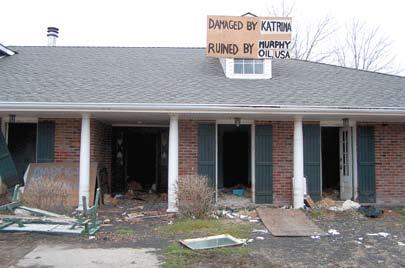
2 minute read
When it Rains, It Pours
By Hartwell Carson, French Broad Riverkeeper
Gas stations, parking lots, junkyards and other facilities are too often located in floodplains.
FEMA estimates that more than nine million gallons of oil spilled from Gulf Coast pipelines and storage tanks during the 2005 hurricane season. The Murphy Oil spill, from damaged storage tanks, magnified the destructive force of the storms and made cleanup a toxic nightmare for more than 1,700 homes.
AP P hoto R iverkeeper
»In 2004, as the driving rain from Hurricanes Frances and Ivan rushed down streams and creeks to the French Broad River, waterways flowed over their banks. The water swept through roads and homes, businesses and plenty of pollution. The velocity of flood water uprooted oil and gas storage bins, pouring their contents directly into the French Broad River. Trash, antifreeze, oil and gas, and other pollutants from the junkyards that line the French Broad River were swept downstream. The events were a strong reminder to citizens of Western North Carolina of the costs of developing in flood-prone areas.
Yet the lessons from this storm have not been realized. The French Broad River is still lined with

junkyards that frequently spill oil into the river and onto surrounding ground. The pollutants wait on the ground for the next rain and then wash off into the river. Enforcement of state laws passed after the storms to protect the floodplain has floundered. Illegal junkyards continue to spring up in the French Broad’s floodplain. And these junkyards continue to crush cars along with the fluids contained inside. A recent visit to one of these facilities turned up a stream that ran with the sheen of oil. The junkyard that borders the stream has puddles of oil and gas that flow unabated to this stream.
Floodplains have enormous potential to be visual, environmental and economic resources for our communities. They protect our water quality by filtering out pollutants and provide great wildlife habitat. They offer excellent recreational areas for bike riding and walking. And economically — when transformed into greenways — floodplains have shown the remarkable ability to raise property values and revitalize neighborhoods. Our floodplains should be home to parks and recreational sites instead of junkyards and gas stations. They should be protected so that if they flood, there is little or no impact to businesses, homes or our communities. Rains will fall and rivers will flood. We need to ensure that these events don’t put our waterways at risk by toppling oil and gas infrastructure and flushing parking lots and junkyards of dangerous toxic chemicals. Getting oil out of our floodplains is a win-win for our community and all our watersheds.










